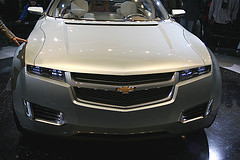
Facing a pounding from financial markets, GM has been taking its lumps from late-night comedy as well. On May 20th, retiring Vice Chairman Bob Lutz appeared on CBS' Late Night with David Letterman to defend against Dave's complaint that the Chevy Volt's electric range would only take him "to the end of his driveway and back".
Lutz countered Dave's arguments by explaining that the Volt's 40-mile range is supplemented by a gas fuel tank that will kick in to recharge the battery when its charge drops too low. Most owners won't burn a drop of gas during the week for their daily commute, but will be able to make longer trips of up to 300 miles on a single tank as they normally would in a regular vehicle.
Most observers of the emerging green auto market are looking to Plug-in Hybrids (PHEVs) like the Volt to reduce our emissions in the next 5 years. Engineered differently from classic hybrids such as the Toyota Prius, PHEVs can be recharged directly from household outlets or at public service stations. Additionally, they are tailored for most commuters' driving habits because they operate purely on a battery charge for limited ranges of anywhere from 40 to 200 miles.
The sticker price of the 4-seat sedan will be set at $40,000, but the cost to consumers will be only $32,750 after a government rebate is factored into the cost. Although higher by about $10K over comparable models, the savings on fuel costs will make up for the initial outlay over the lifetime of the vehicle.
Performance also won't be an issue--according to recent testing, the Volt will do 60 mph in around 8.0 seconds via its electric motor only. That's 2 seconds faster than the 2009 Toyota Prius, and 4 faster than the Honda Insight.
Regenerative braking will also allow the Volt to recapture kinetic energy to keep the battery charged. Although the Prius offers this feature as well, the Volt will also have a "one-pedal" mode for stop-and-go city driving: when the gas isn't pressed, the brakes are instantly engaged, allowing the car to optimize energy recapture from the electro-hydraulic brakes.
The frustrating news for consumers is that the Volt won't be available domestically until 2011. However, Lutz is optimistic that the Volt will be able to successfully compete internationally, since it meets all standards for emissions and safety worldwide.
Although end-users will have to wait at least another 18 months to drive it, the Volt is truly no joke.

